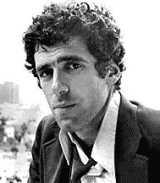Thursday Great Actor Blogging: Elliott Gould
 When you ask people "Who was the actors who made the 1970s film renaissance possible?", they usually name Jack Nicholson or Al Pacino or Robert De Niro. I prefer to say Elliott Gould instead.
When you ask people "Who was the actors who made the 1970s film renaissance possible?", they usually name Jack Nicholson or Al Pacino or Robert De Niro. I prefer to say Elliott Gould instead.Partially, people tend to say Nicholson or Pacino or De Niro because all three have remained big stars to this day. All three have generally selected good roles that kept their careers moving forward (until the point that, today, they're universally regarded as the greatest of all living actors). Gould's greatness was much more condensed into a relatively short time frame (1969-1975 or so) - by 1979, he was taking small roles in the Muppet movie series.
Why I think Gould is such a ground-breaking actor is that Gould's acting made a particular realm of male psychologies and personalities possible within the American cinema. James Dean and Marlon Brando made an initial foray into exploring the inner nature of American masculinity. However, neither was able to dig very far - partially, because neither is plausible as a loser or schmuck character - Dean and Brando were just too handsome and too obviously sexually appealing to women.
No major actor was able to, in movie after movie, build a career based upon as non-heroic characters as Gould did. Dean and Brando's characters, whatever else their flaws, were always interesting and exciting (Dean's character in Rebel is bullied, but eventually able to win the chickie race and get the girl - Gould's characters would have just been bullied). Gould was able to invigorate what losers or schmucks into, no, not heroes, but a sense that these characters are what real lives actually are. They don't become heroic, but become real instead.
The height of Gould's career was extremely short, and the core of his work only a handful of movies - Bob&Carol&Ted&Alice (1969), MASH (1970), Little Murders (1971), The Long Goodbye (1973), and California Split (1974). Of these, perhaps California Split is my favorite. More on Gould later.


4 Comments:
fuck yeah. also james caan. ever see the gambler? also good. both capture something about the decade -- ever encroaching vice.
can you imagine when i was a teenager i thought elliot gould was hot? oy vey es mir.
Hell, yeah!
There were three of them---Gould, Caan, and George Segal. Great actors, real stars, a few excellent films, and then after 1980? Nothing.
I still don't understand why The Long Goodbye didn't have any follow ups. Can you imagine Gould in The Big Sleep? Or Farewell, My Lovely?
Not as good as having the films, but I've really enjoyed listening to Gould read Chandler for Books on Tape.
The Long Goodbye didn't have follow-ups because:
a. Altman's career declined
b. Elliot Gould's career really went nowhere almost immediately after The Long Goodbye (his next movie was some atrocious thing called The Robo-Man).
c. Altman had other projects which he wanted to do first - and when he did them, he was essentially kicked out of Hollywood.
I've been thinking about Lance's comment for a long time:
Why did Nicholson, Pacino and De Niro continue to prosper while Caan, Gould and Segal did not?
Part of the answer is that Pacino and De Niro are believable as fairly conventional detective characters or criminals or mobsters - with much more depth than average, but still fairly conventional character-types within potential Hollywood blockbusters. See De Niro in Heat, the Analyze.... series, Casino, City by the Sea, Goodfellas, Midnight Run, Once upon a Time in America. See Pacino in Scarface, Carlito's Way, Heat, Donnie Brasco, Any Given Sunday.
I think there's just no way you can see Gould or Segal as conventional character-types. That's precisely why their work in the 1970s was so important.
Caan is a special case, methinks
Post a Comment
<< Home